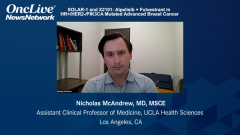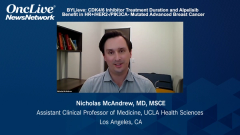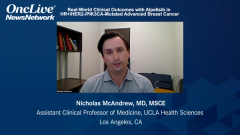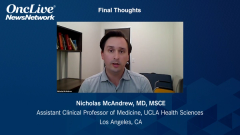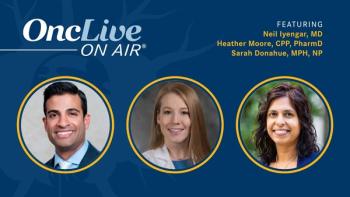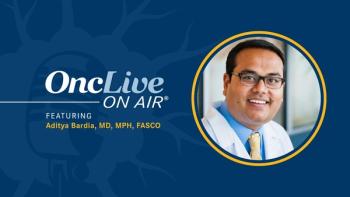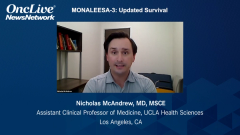
BYLieve: CDK4/6 Treatment Duration and Alpelisib Benefit in HR+/HER2-/PIK3CA-Mutated Advanced Breast Cancer
Nicholas McAndrew, MD, MSCE, discusses the impact of CDK4/6 therapy duration on alpelisib benefit in patients with HR+/HER2-/PIK3CA-mutated advanced breast cancer from the BYLieve trial.
Nicholas McAndrew, MD, MSCE: As we think about the impact of duration of a prior CDK4/6 inhibitor on patients receiving alpelisib, the BYLieve abstract that was presented at the 2021 ASCO [American Society of Clinical Oncology] Annual Meeting helps us understand where many of these patients fit within current practice patterns. By the time the SOLAR-1 study came out—which is the pivotal phase 3 study that helped alpelisib gain approval and become the first PI3K inhibitor approved for metastatic breast cancer—the population of SOLAR-1 didn’t necessarily fully reflect the population of patients that would end up going on the drug in the post-CDK4/6 inhibitor era. The minority of patients in SOLAR-1 had received a prior CDK4/6 inhibitor, so there was an important need to understand whether patients who had received a prior CDK4/6 inhibitor still benefit from an alpelisib-containing regimen.
The goal of the BYLieve study was aimed to try to clarify that. They did a study looking at 3 cohorts of patients. One cohort was patients who had immediately received a prior CDK4/6 inhibitor and an aromatase inhibitor, who then went on to receive alpelisib and fulvestrant. They also enrolled patients who had immediately received a CDK4/6 inhibitor and fulvestrant and went on to receive alpelisib and letrozole. There was a third cohort for patients who had not received any prior CDK4/6 inhibitor. The most recent presentation was looking at the patients who were in cohorts A and B who had previously received a CDK4/6 inhibitor with some kind of endocrine therapy.
They stratified patients by 2 levels based on the duration of prior CDK4/6 inhibitor: patients who had received a greater than the median within that population, or less than the median. They really wanted to understand whether patients who were on a CDK4/6 inhibitor for a long time or a short time before they came off had differential benefit from alpelisib. Interestingly, there was no impact on the duration of a prior CDK4/6 inhibitor on progression-free survival when patients had then gone on to receive alpelisib. Whether patients had received a CDK4/6 inhibitor for a long time or a short time did not seem to impact whether a patient did well or how long a patient’s progression-free survival was on alpelisib. That helps us understand that even if patients develop early resistance to a CDK4/6 inhibitor, it may not predict the degree of benefit they would receive if they went on to alpelisib if they have a PIK3CA mutation. Also, importantly, there were no new safety signals noted in this study. The most common adverse effects were things we had seen in SOLAR-1, like a rash, hyperglycemia, and nausea, which are well known to this population and physicians treating these patients.
Transcript edited for clarity.


